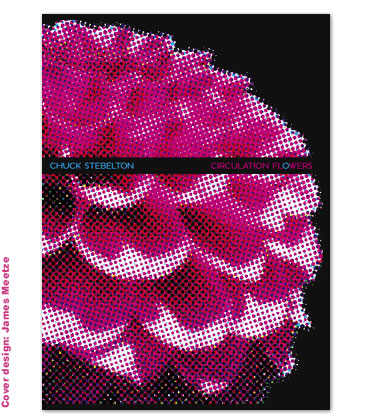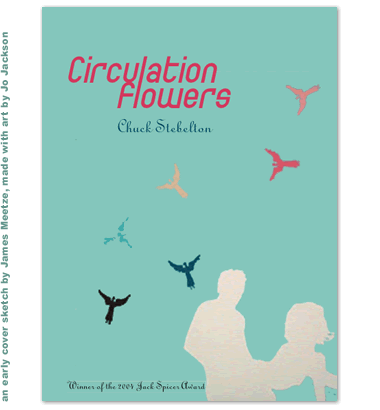
3 SEPT 07
How has your first book changed your life?
100. Chuck Stebelton

What do you remember about the day when you saw your finished book for the first time?
I was at dinner with my friend Stacy Szymaszek. She had just moved to New York from Milwaukee to take on a new job, and I had just moved to Milwaukee from Chicago to do the same. This was our first chance to catch up with each other in person in the midst of all these changes. That the occasion included the arrival of this gorgeous object couldn't have been more special. It was an extraordinary day. I was visiting New York for the first time in a long time. I remember taking a shuttle into Manhattan from the Newark airport that morning, then I walked a good length of Broadway to Strand Bookstore. I found a used copy of Jeff Clark's Music or Suicide at the Strand. From there I hoofed it directly to Angelika Film Center and saw The Squid and the Whale, then grabbed a beer before meeting Stacy at a brick oven pizza place near the Zinc Bar. When we got a table and sat down, she pulled a copy of the book out of her bag, and I was like, "That's mine." That was the first time I laid eyes on the actual book.
I remember being taken by surprise at just how well James Meetze's design for the cover worked in real life. It seemed sleek and weighty and textured, and I loved the way the pinks and blues and yellows seemed to shift against a flat black background, and every color just popped. I didn't dare to look too closely inside the book until I was alone for fear of spotting a typo, of finding a change that might not have made it into the final version. I also remember flipping through and eyeing the page numbers, the two section breaks, and the relationship of the typeface used for titles to the type size in the body of the poem. I'd scrutinized these things in version after version of the draft manuscript in PDF. Now that the thing was bound and living in the world as a book, these elements took on something more palpable. Weirdly, though, and this became a bit of a problem for me to deal with after I'd lived with the book for a while, the book still didn't feel permanent. I continued ruminating on a few nagging changes to the manuscript. James indulged me only in the one instance that we both agreed that it was necessary, else I might not ever have let it go.
Do you mean that when CF went out of print and before it was printed again, you were allowed one change that James agreed was necessary?
Yeah, that was part of the hold up. The necessary change had to do with the front matter of the book. The indulgence on the part of James was that he accommodated me when I insisted on also making a change to one of the poems. I had a distorted sense of that one poem's value and it was a regrettable move on my part. I learned the hard way that it's healthier to let some things go and focus on the next project instead.
Why did Stacy have a copy of your book before you did?
James had sent twenty copies to her directly from the printers so we could be sure to have it available at a reading that had been planned for after its publication date. I read from the book for the first time that following Monday night.
Before that day, did you imagine your life would change because of the book's arrival?
No, because so much of my life was in transition just then. There were bigger changes afoot. And it was a long process seeing Circulation Flowers through publication. A few poets close to me saw publication of their own first books in the meantime. After a couple of years of living daily with the idea of this book, it was easier to be realistic about what its arrival might engender.
When & how did you begin being involved with Woodland Pattern?
I used to make book buying pilgrimages to Woodland Pattern when we still lived in Chicago. There's really no place like it. Occasionally we would drive up to Milwaukee for a reading or something really special like the Niedecker conference. When the position of Literary Program Director became available in the summer of 2005, I had been running a weekly series of readings and talks at Myopic Books in Chicago for close to two years. Stacy was very encouraging once I decided to apply. Anne Kingsbury and Karl Gartung (the founders) and I found that we had a lot of affinities. Our enthusiasms clicked. It's been two years this month since I moved to Milwaukee to work at Woodland Pattern.
Were you involved in designing the cover of Circulation Flowers?
Only to the extent that I would go ape! over anything James came up with. He's a terrific book designer. Before he started typesetting and coming up with interior design possibilities, I suggested using a Jo Jackson image for the cover. James searched around and initially came up with this one

before deciding instead to go with the pinkest flower I ever saw.
Were there any surprises?
The big surprise came on the day James called to tell me he was going to publish the book. [James Meetze is the founder/editor of Tougher Disguises Press.] Earlier the very same day a rejection letter came in the mail from the one MFA program that I'd ever gotten it together to apply to, and I was actually banking on moving to that other city. I knew it was a rejection because the envelope had bulk metered postage. After the disappointing news I wanted to get outside so decided to walk to the grocery store and get some toothpaste and junk like that. I was sitting in my apartment after running my errands and thinking about what I might do next. The phone rang and it was James. As soon as he introduced himself that day's news did a 180. It ended up taking just over two years from that date to see the book into print.
What did you do to promote the book, and what were those experiences like?
I notified friends and bookstores and gave some readings. Most of that activity actually took place while the book was still unavailable. I'm sometimes surprised that the book made its way to certain readers. It's been a crash course in the punishing economics of small press distribution.
Can poetry create change in the world?
It can engage individuals to want to make change in the world. Progressive poetry communities are rich in their ability to sustain that impulse. One comes to poetry with or without a politics and poetry teaches you that everything is political. It can remind you to be active.
What influence has the book's publication had on your subsequent writing and other artistic pursuits?
The experience has given me a taste for playing things more organically with current projects. I'm proceeding chapbook by chapbook and a second collection is now taking shape around those.
How do you feel about the critical response to your book and has that had any effect on your writing?
My chapbook Precious appeared around the same time as the book and it received much more substantive feedback at first. That experience was part of the reason I decided to focus on smaller projects. The critical response to Circulation Flowers was much less immediate. But there was some occasional low level noise about the book online and the fact that a few people were actually engaging with it seemed generous to me. Every comment is instructive, even the mixed reviews. More recently I received a letter out of the blue from Michael Cross responding to the book. It was one of those letters that can just make your year.
Is there something you're doing now that you think will bring about a change that you seek?
Working at Woodland Pattern it always feels like we're making a difference. Right now Karl Gartung and I are running a sort of research group using the Duncan / Levertov correspondence to look at issues of how an artist can or should respond to such times. Our idea is that this will result in a public program next spring or possibly in the fall. I think we'll always have a lot to learn from both Duncan and Levertov. The question of literary activism is a slippery one for me.
:
A poem from Circulation Flowers by Chuck Stebelton:
The Second Coming
What we will be eating from that plenty reminds
me that today our own hot swelter only wants
to get you high. Softer greens will greet you until
ice turns black. The heat of such beauty behind
the eyes surprises me when you surprise me by
the lake. Glaciers that, floating, rise also float.
You suck my thumb. I touch your nose. In dust
and to the right a theatre of the indoors gives you
an idea that we ought to go for a walk. The straight
on fries white and yellow in linseed oil. I address
this image to you because my eye finds it refreshing.
I have dined a lot. I have thought to become a dancer.
You see a building as if drenched by the rain. It is a
kindness that the puddle remains under the light
pole that opens your alley up to drips. A boundary
moves with all its elements in place. Two entities
more minute make exchanging glances. The quiet
have assumed an attitude of school. Touch will put
me at ease for as long as I can stand to be separate.
I am otherwise speechless surrounding you. You
wake up early and happy again. The sleepiest lack
convictions, while the sweetest are full of passionate
intensity. We certainly have every right to expect an end
to come as it did for the spirit of innovation. The idea of our
city on the river still burns and happens to be beautiful. It is
cold outside in the orange of autumn. It is warm inside your
coat. I would prick it. I would send rusty arrows to prickle
that thought balloon. The summer cannot hear the speak
through, but now a green apple against a pylon of days starts
the day early, as do those waiting for the trees to explode.
Traffic goes by, cigarettes spark occasionally. The regular
heart of matters sounds a beep of victory and nothing sees
changes outside of the moment. I have remembered my
master's hold on me at the least appropriate moment. I am
to go to a city now. The river there has become cleanly rapid.
Pink trees green and the smell of paper is the taste of water
held too long in the mouth. I could locate the source of this
unimaginable joy if I could swallow and, swallowing, make
no sound reach my ears. The darkness, like a head of horns,
drops again. The pall hangs over me like a bear. I didn't
know whether to duck or run, so I ran. I ran ahead into the
gaze and stood there, then, becomingly. The endless arc
of the sun, wheel of seasons. The endless arc of the sun,
wheel of seasons. The endless arc of the sun, wheel of
seasons. The endless arc of the sun, wheel of seasons.
Its is the posture vertigo takes. I am, before me, at hand.
. . .
next interview: Michael Robins
. . .